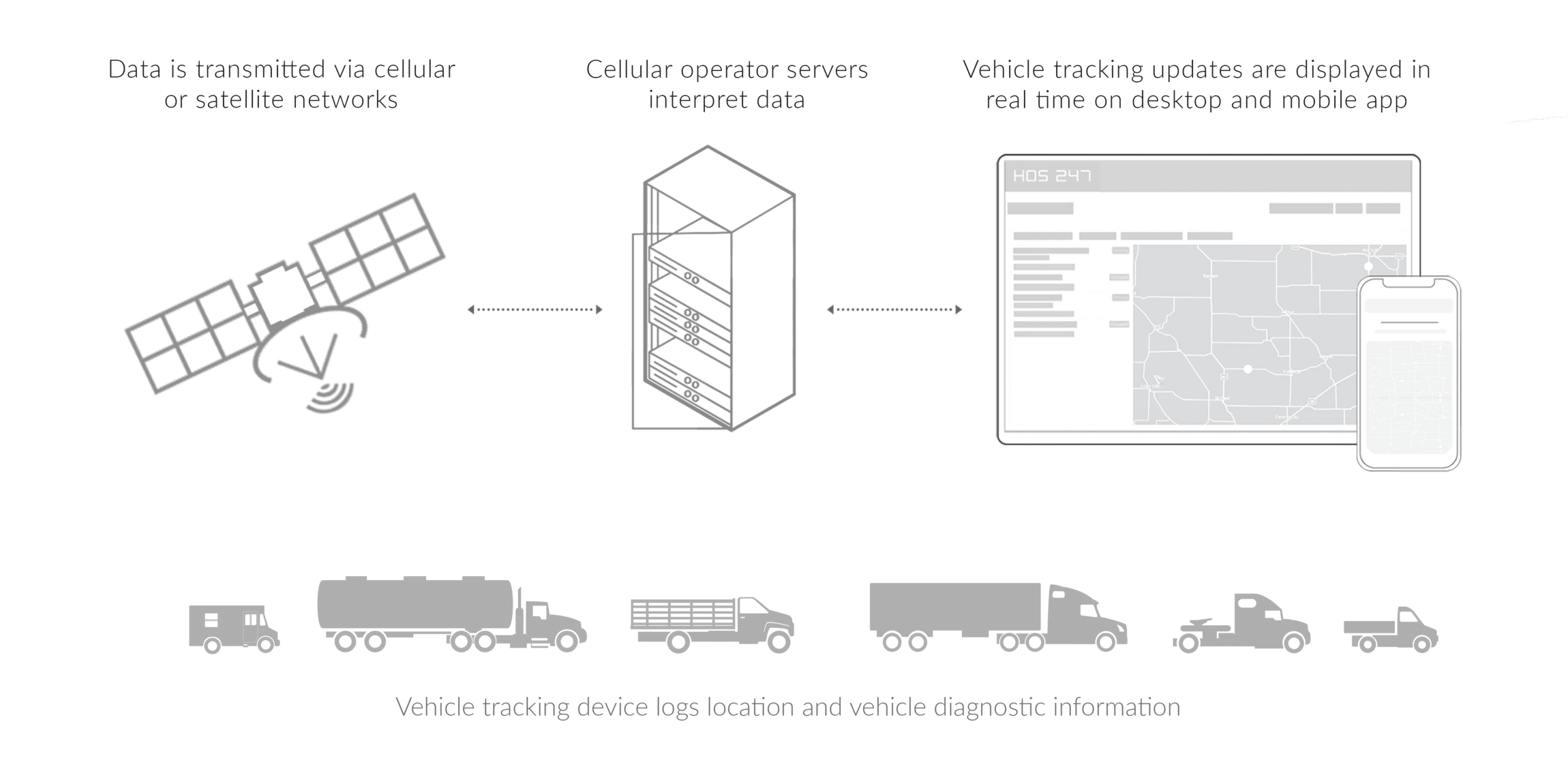Are you looking for an effective way to reduce fuel and operational costs, improve driver safety, increase productivity and meet state and federal compliance rules? GPS tracking for fleets is an excellent solution for you. GPS tracking is an advanced telematics tool that collects data from vehicles and their drivers in real time and sends it to a fleet management system, allowing supervisors to monitor and streamline operations.
Trackers connect to the truck’s diagnostic port to provide access to accurate information about vehicle speed, fuel level, fault codes, battery charge, idle time, engine RPM and other crucial data. That’s why GPS fleet tracking systems have become so popular in the USA. In this article, we will examine the critical features of GPS tracking for fleets and show how these systems can help your business thrive.
Do you have any questions? Talk to ELD Advisor: 650-405-3372 or Request Callback
Understanding GPS Fleet Tracking Systems
Modern GPS fleet tracking systems combine satellite technology with vehicle telematics to provide comprehensive fleet management solutions. These systems use a network of satellites to determine vehicle locations with remarkable precision, while onboard sensors collect vital performance data. This information is transmitted through cellular networks to centralized servers, where it’s processed and made available to fleet managers through user-friendly interfaces.
The technology has evolved significantly from simple location tracking to become an integral part of fleet operations. Today’s systems offer real-time insights into vehicle performance, driver behavior, fuel consumption, and maintenance needs. This comprehensive approach to fleet management has made GPS tracking an essential tool for businesses of all sizes.
Main Features of GPS Tracking for Fleets
There are four essential features that any reliable tracking system must have to work at its full potential.
Real-Time GPS Tracking
Real-time GPS tracking helps achieve complete fleet visibility to monitor your vehicles accurately and effectively. Access to accurate information increases workflow efficiency and improves communication between drivers and fleet managers, leading to better business decisions.
Vehicle Maintenance
With this feature, vehicle maintenance routines are scheduled automatically by the system. It sends managers reminders about upcoming service events in advance. Service schedules are effective and accurate as they are based on mileage, hours of usage and a record of all past service history.
Fault Code Detection
Fault code detection functions via self-diagnosis and reporting. It automatically identifies and flags performance changes. When a problem is detected, the system turns it into a code (DTC) and notifies the driver and manager so the problem can be addressed in a timely manner, avoiding costly repairs and downtime.
Automated Idle Tracking
Among other GPS fleet tracking benefits that help effectively reduce operational costs and increase driver performance, there is an automated idle tracking feature. It provides detailed fuel performance data and alerts the fleet manager of instances of excessive idling to help them correct the behavior. With this feature, carriers save money and minimize their CO2 footprint.
Advanced Capabilities and Integration
The evolution of GPS fleet tracking technology has transformed fleet management from simple location monitoring to comprehensive business intelligence. Modern systems leverage cloud computing, artificial intelligence, and advanced analytics to provide insights that were unimaginable just a few years ago. These sophisticated platforms integrate seamlessly with existing business systems, creating a unified ecosystem that streamlines operations across all aspects of fleet management.
At the heart of these advanced systems lies the ability to process vast amounts of data in real-time, turning raw information into actionable insights. Today’s GPS tracking solutions offer:
- Predictive analytics. Systems use historical data to forecast potential maintenance issues and optimize route planning, helping fleets prevent breakdowns before they occur
- Integration capabilities. Seamless connection with other fleet management tools, including accounting and dispatch software, creating a unified operational platform
- Automated reporting. Custom reports generated automatically for compliance, fuel efficiency, and performance metrics, saving administrative time and improving accuracy
- Route optimization. AI-powered algorithms suggest the most efficient routes based on multiple factors including traffic patterns, weather, and delivery windows
- Driver safety scoring. Comprehensive evaluation of driving patterns to improve safety and reduce risk, leading to better insurance rates and fewer accidents
Real-World Applications and ROI
The implementation of advanced GPS tracking systems represents a significant investment for many fleets, but the return on investment typically becomes apparent within the first few months of deployment. Companies across various sectors of the transportation industry report substantial improvements in operational efficiency and cost reduction. The impact is particularly noticeable in key performance indicators that directly affect the bottom line:
- Fuel savings. Average reduction of 10-15% in fuel costs through improved routing and reduced idling
- Insurance costs. Many providers offer reduced premiums for fleets using GPS tracking, sometimes up to 25% lower
- Maintenance expenses. Early problem detection leads to 20-30% reduction in major repair costs
- Labor efficiency. Improved dispatch and routing can increase deliveries per driver by 15-20%
- Customer service. Real-time tracking enables more accurate delivery estimates and better communication
These advanced capabilities and their measurable benefits have made GPS tracking systems an indispensable tool for modern fleet operations. The technology continues to evolve, with new features and capabilities being developed to address emerging challenges in the transportation industry. Fleet managers who leverage these advanced tools find themselves better positioned to compete in an increasingly complex and demanding market environment.
GPS Fleet Tracking Systems and Operational Efficiency
Understanding how GPS tracking features translate into tangible business benefits is crucial for fleet operators. Each component of a GPS fleet tracking system contributes to three main areas of operational improvement: enhanced productivity, cost savings, and improved decision-making.
Enhanced Productivity
Real-time tracking capabilities directly impact daily operations by enabling more efficient fleet management. When dispatchers can see their entire fleet at a glance, they can make quick, informed decisions about vehicle assignments and routing. This visibility translates into:
- Dynamic route adjustments. Dispatchers can redirect vehicles in real-time to accommodate urgent deliveries or avoid traffic delays.
- Resource optimization. Better allocation of vehicles and drivers based on location and availability.
- Reduced administrative time. Automated logging and reporting reduce paperwork and manual data entry.
- Improved customer service. Accurate arrival time estimates and proactive delay notifications.
The maintenance tracking and fault code detection features further enhance productivity by minimizing unexpected downtime. When managers receive early warnings about potential vehicle issues, they can schedule maintenance during off-hours, preventing disruptions to regular operations.
Cost Savings
GPS tracking systems deliver measurable cost reductions across multiple areas of fleet operations:
- Fuel management. Real-time idle monitoring and route optimization typically reduce fuel consumption by 10-15%.
- Maintenance costs. Preventive maintenance scheduling and early problem detection can reduce repair costs by up to 30%.
- Insurance premiums. Many insurance providers offer reduced rates for fleets using GPS tracking systems.
- Compliance costs. Automated logging and reporting help avoid costly violations and fines.
- Labor optimization. Better route planning and dispatch efficiency reduce overtime expenses.
The systematic monitoring of these costs through GPS tracking systems allows fleet managers to identify trends and implement targeted cost-reduction strategies.
Improved Decision-Making
Perhaps the most significant long-term benefit of GPS fleet tracking is its impact on strategic decision-making. The wealth of data collected by these systems provides insights that inform both daily operations and long-term planning:
- Performance analytics. Detailed metrics on vehicle and driver performance help identify areas for improvement.
- Route analysis. Historical data reveals patterns that can be used to optimize regular routes and delivery schedules.
- Asset utilization. Usage patterns help determine optimal fleet size and vehicle replacement timing.
- Risk management. Driver behavior monitoring supports safety program development and training initiatives.
- Resource planning. Seasonal trends and peak usage data inform staffing and vehicle acquisition decisions.
By transforming raw data into actionable insights, GPS tracking systems enable fleet managers to make evidence-based decisions that improve operational efficiency and support business growth. The combination of real-time monitoring and historical analysis creates a powerful tool for both tactical and strategic planning.

Benefits of HOS247 GPS Tracking
The obvious benefits of GPS tracking make this device indispensable for big and small trucking businesses. The market offers plenty of options of US fleet tracking GPS softwares. The question is how to choose the right one. Besides the essential features mentioned above, you may look for a provider that offers an advanced and reliable system that you can get the most out of.
With HOS247 trackers, our clients can be sure that the needs of their business will be addressed in the most professional way. Amongst the GPS fleet tracking benefits we offer are the following.
HOS247 GPS Tracking for Fleets Is Flexible
- Trial period. Users get a chance to familiarize themselves with the software during a two-week trial period. If you decide to return the product within that time, you will get a refund.
- No-contract policy. HOS247 offers a flexible monthly or yearly subscription service to adapt to the specific needs of our clients. Because we understand that the needs of our customers may change in the same way the market does, we have no lockdown period that forces clients to commit for years.
- One-year hardware replacement warranty. HOS247 guarantees a smooth run of its devices, providing a free replacement in case of malfunction.
HOS247 Trackers Are Easy to Install and Use
- Quick and straightforward installation. The installation of HOS247 GPS service fleet tracking takes only a few minutes. You won’t need a specialist to set up the system. The driver or fleet manager can easily install the hardware and download the software from our web page.
- Ease-of-use. Clients enjoy the transparency and simplicity of our software. Its friendly interface encourages the intuitive use of the program. If you still have doubts, you can resolve them by calling our support center.
- Compatibility. GPS tracking for fleets works perfectly well with trailers, light- and medium-duty trucks, and even pick ups. Also, the software easily pairs up with Android and iOS tablets and smartphones.
HOS247 Is a Committed to Customer Satisfaction
- Multilingual customer services. One of the main goals of HOS247 is to provide efficient, customer-centric service. We praise our technical support team, which consists of professionals who speak English, Spanish, Russian and Polish. It’s enough to have a look at our review section to see how the friendliness and skillful assistance of our customer service team helps truckers do their jobs.
- Efficient technical support. To optimize the use of the system, we provide assistance from our experts from Monday to Sunday. HOS247 has a callback policy, which means that we will never leave you without an answer.
HOS247 Trackers Use Advanced Technology
- 4G technology. As the era of 3G comes to an end in the USA, at HOS247 we already provide our clients with a faster, more efficient service.
- Improved safety and security uses. Concealed tracking devices included in our GPS tracking for fleets notifies fleet operators if the vehicle is taken to unauthorized locations and helps recover assets in case of theft.
- Extra features. In addition to all the features mentioned earlier, HOS247 also offers IFTA mileage calculations and electronic logging devices (ELDs).
Do Fleets Need ELDs?
According to FMCSA, the ELD rule applies to most USA-, Canada- and Mexico-domiciled drivers that:
- Weigh more than 10,001 pounds.
- Are designed or used to transport 9 or more passengers (including the driver) for compensation.
- Are designed or used to transport 16 or more passengers not for compensation.
- Transport hazardous materials in quantities requiring placards.
The mandate allows limited exemptions for drivers who:
- Operate under the short-haul exemption since they are not required to keep RODS (records of duty status).
- Keep RODS for no more than 8 days out of a 30-day period.
- Conduct drive-away-tow-away operations, in which the vehicle being driven is the commodity being delivered.
- Drivers of vehicles with engines manufactured before 2000.
As regulations continue to evolve, fleet managers must stay informed about any changes or updates to maintain compliance. Regular training and system updates help ensure continued adherence to FMCSA requirements while maximizing the benefits of ELD technology.

Conclusion
For fleets subject to the ELD mandate, choosing a reliable and compliant ELD provider is crucial. The right system not only ensures regulatory compliance but can also provide additional fleet management benefits through integrated GPS tracking and telematics capabilities.
HOS247 is top-rated by truckers thanks to our commitment to customer satisfaction. Our customers appreciate the quality of technical support and our easy-to-install hardware with access to most Android and iOS devices via Bluetooth. HOS247 is approved by the FMCSA as a certified vendor. Our devices track drivers’ HOS automatically, complying with DOT regulations with minimum effort from drivers and managers.
Our goal is to make the experience of using electronic logbooks as efficient and simple as possible, helping our clients avoid violations and fines. Request our trial and discover how you can increase efficiency by using an ELD-based GPS system.

I’ve co-founded, built and managed several transportation-related businesses. Now, I’m a founder and CEO of HOS247 – an AI Transportation Platform for trucking companies, freight brokers and other logistics operations. We are transitioning old-style operations to technology-advanced logistics entities and help them to grow their businesses. ELDs (electronic logging devices), fleet tracking and management 2.0 combined with AI-powered dispatch tools.












For truckers across the US, the job is more than just a means of making a living—it’s a way of life. However, with the implementation of the ELD law, electronic logging devices have become an integral part of their daily

VDO RoadLog Closing Down Another ELD provider has shut down, leaving fleets and drivers scrambling to find an alternative provider to handle their driver logs and transition to entirely new software. Continental Commerce Vehicles & Aftermarket issued a … … Read More

Navigating the world of commercial driving requires more than just the ability to maneuver a vehicle; it also involves a detailed approach to logging hours of service (HOS) as required by the Department of Transportation (DOT). These DOT log books